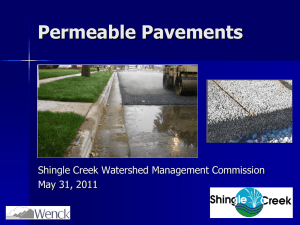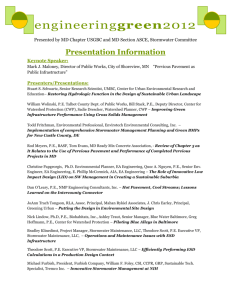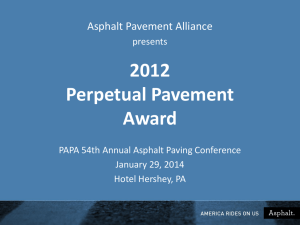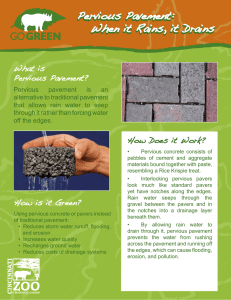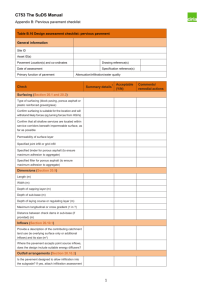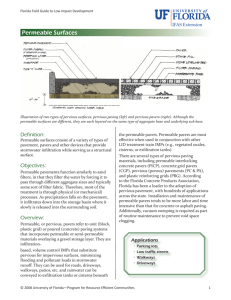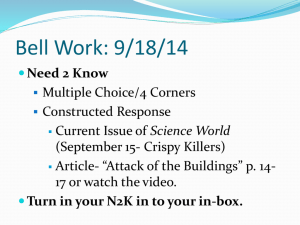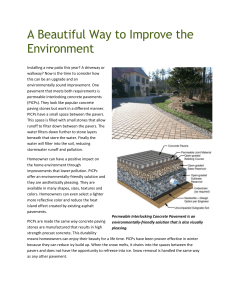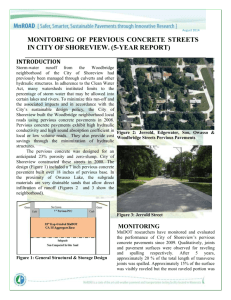Pervious Pavement Controlling water runoff BMP
advertisement
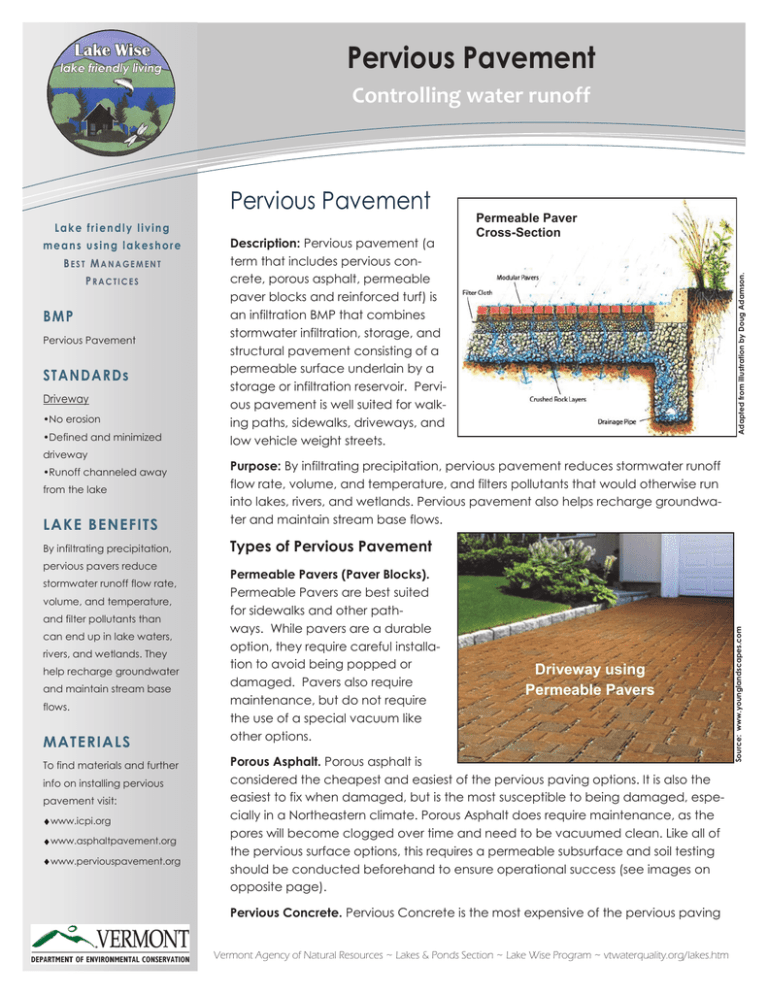
Pervious Pavement Controlling water runoff Lake friendly living BEST MANAGEMENT PRACTICES BMP Pervious Pavement STANDARDs Driveway •No erosion •Defined and minimized driveway •Runoff channeled away from the lake LAKE BENEFITS By infiltrating precipitation, pervious pavers reduce stormwater runoff flow rate, volume, and temperature, and filter pollutants than can end up in lake waters, rivers, and wetlands. They help recharge groundwater and maintain stream base flows. MATERIALS To find materials and further info on installing pervious pavement visit: www.icpi.org www.asphaltpavement.org www.perviouspavement.org Description: Pervious pavement (a term that includes pervious concrete, porous asphalt, permeable paver blocks and reinforced turf) is an infiltration BMP that combines stormwater infiltration, storage, and structural pavement consisting of a permeable surface underlain by a storage or infiltration reservoir. Pervious pavement is well suited for walking paths, sidewalks, driveways, and low vehicle weight streets. Purpose: By infiltrating precipitation, pervious pavement reduces stormwater runoff flow rate, volume, and temperature, and filters pollutants that would otherwise run into lakes, rivers, and wetlands. Pervious pavement also helps recharge groundwater and maintain stream base flows. Types of Pervious Pavement Permeable Pavers (Paver Blocks). Permeable Pavers are best suited for sidewalks and other pathways. While pavers are a durable option, they require careful installation to avoid being popped or damaged. Pavers also require maintenance, but do not require the use of a special vacuum like other options. Driveway using Permeable Pavers Porous Asphalt. Porous asphalt is considered the cheapest and easiest of the pervious paving options. It is also the easiest to fix when damaged, but is the most susceptible to being damaged, especially in a Northeastern climate. Porous Asphalt does require maintenance, as the pores will become clogged over time and need to be vacuumed clean. Like all of the pervious surface options, this requires a permeable subsurface and soil testing should be conducted beforehand to ensure operational success (see images on opposite page). Pervious Concrete. Pervious Concrete is the most expensive of the pervious paving Vermont Agency of Natural Resources ~ Lakes & Ponds Section ~ Lake Wise Program ~ vtwaterquality.org/lakes.htm Source: www.younglandscapes.com means using lakeshore Permeable Paver Cross-Section Adapted from illustration by Doug Adamson. Pervious Pavement Pervious Pavement Controlling water runoff Pervious Concrete Driveway Source: www.bobvila.com Pervious Concrete Cross-Section with Drain Tile Source: www.premiumconcreteonline.com Porous Asphalt Source: www.wolfpaving.com Non-Porous Asphalt options. Because it must be mixed in a very precise way to ensure a strong batch, one will need special training to mix it. Maintenance: Maintenance levels range from medium to high depending on the type of pervious pavement. The use of leaf blowers on permeable pavement can force dirt and debris into pavement void spaces. Avoid blowing leaves, grass trimmings and other debris across permeable pavement. Remove weeds from pavement and replace missing sand or gravel between pavers as needed. Inspect subdrain outlets (if applicable) yearly to verify they are not blocked. Inspect pavement after rains for ponding or other visible problems. If there are problems with standing water, vacuum sweeping with specialized equipment may be required. Concrete grid pavers do not require sweeping. (Maintenance referenced from the Bay Area Stormwater Management Agencies Association) Vermont Agency of Natural Resources ~ Lakes & Ponds Section ~ Lake Wise Program ~ vtwaterquality.org/lakes.htm
